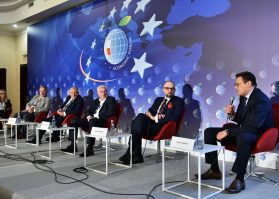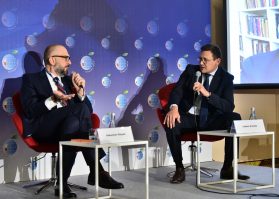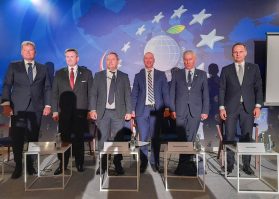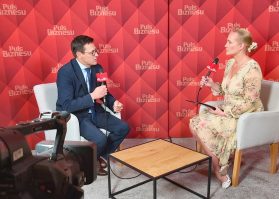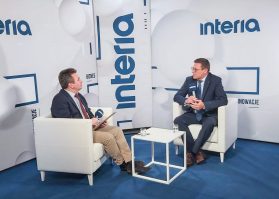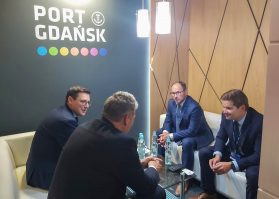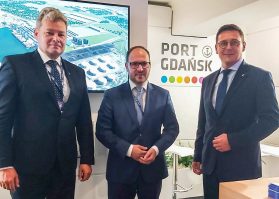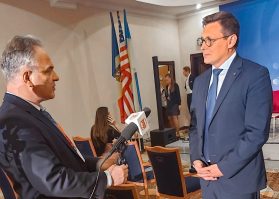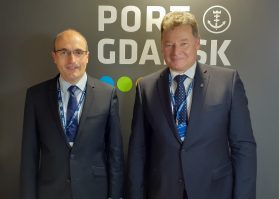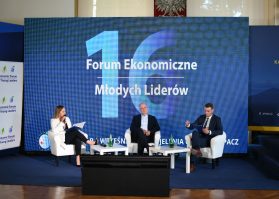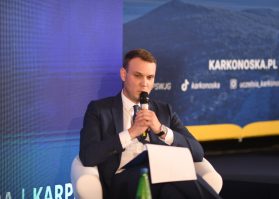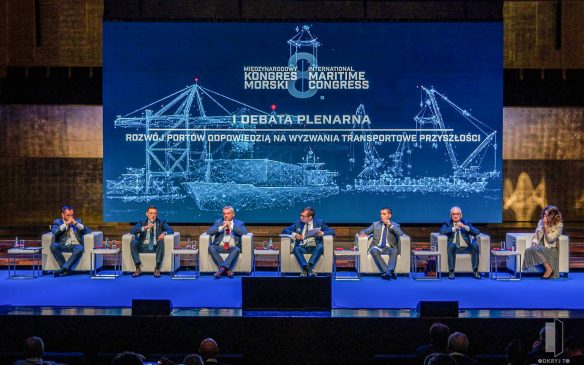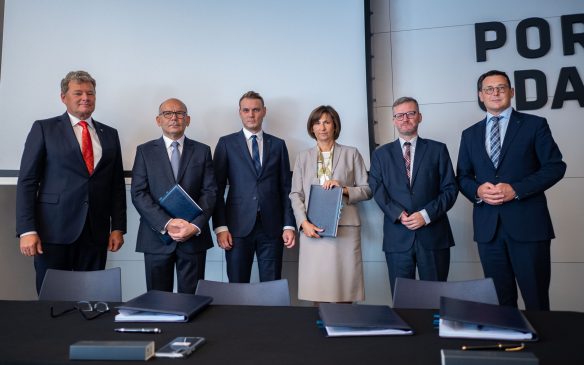Port of Gdańsk at the 30th Economic Forum in Karpacz
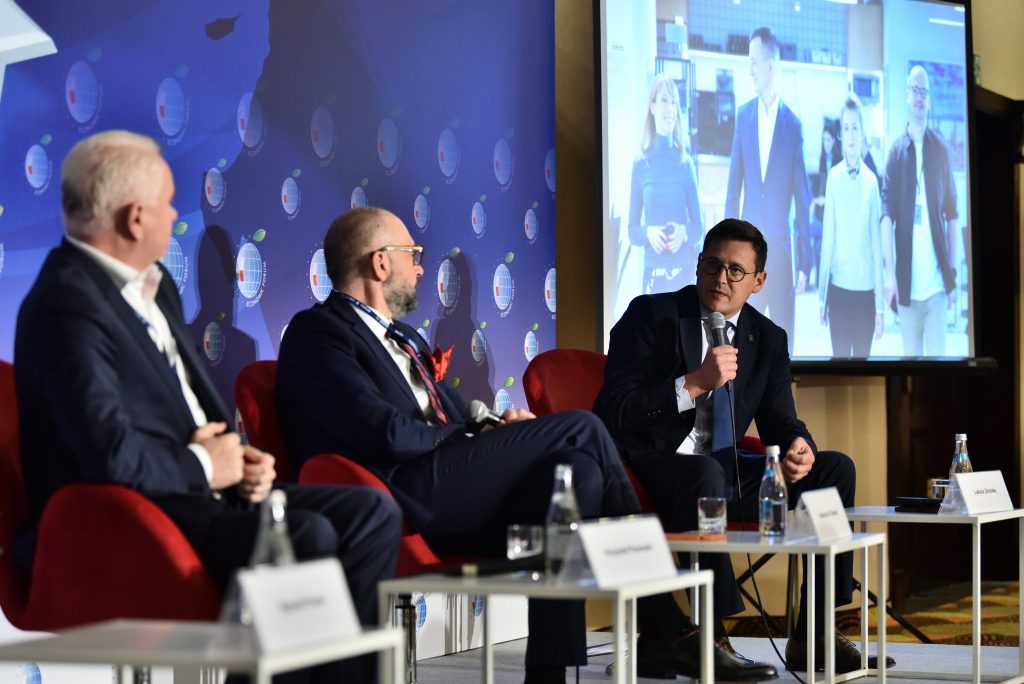
The motto for this year’s Economic Forum is “Europe in search of leadership”. About 400 discussion panels and presentations took place over the three days, as well as many accompanying events. Among the panellists of the economic congress were a strong representation from the Port of Gdańsk. President Łukasz Greinke participated in the panel “Export giants stronger than the pandemic”, Vice-President Sławomir Michalewski discussed the “Potential of the Baltic Sea – Black Sea transport corridor”, while Vice-President Kamil Tarczewski took part in a debate at the Economic Forum of Young Leaders.
During the “Export giants stronger than the pandemic” panel, President Łukasz Greinke pointed out that over the past 5 years the Port of Gdańsk had seen an upward trend in the exports of goods.
“The year 2020 was also outstanding in exports of Polish grain. Over 1.34 million tonnes of grain crossed our quays, while in previous years it averaged about 600,000 tonnes per year. We want the Port of Gdańsk to become a window on the world for Polish entrepreneurs, for goods with the ‘590’ mark. Therefore, our mission is to create opportunities. We are trying to get to know our contractors and their needs so as to achieve our goals together,” explained President Greinke during the debate.
While in Karpacz, the representatives of the Port of Gdańsk Authority visited Kador – a company involved in industrial logistics, assembly and disassembly of production lines, and cargo shipments to Australia, Brazil, China, Canada, Korea and the United States. One of their locations is Miłków, near Karpacz, while the other one is in the Port of Gdańsk.
“We believe that if cargo administrators are sure that we have a modern infrastructure that enables them to handle goods, Gdańsk will become the port of choice. And a port for the export of goods with the “590” mark. Figuratively speaking, we are like a beating heart that needs a circulatory system: the entire road and rail network. Therefore, we need to modernise the port infrastructure so that investing in our port pays off, so that sending goods out into the world is economically viable.”
President Greinke used the example of Krajowa Spółka Cukrowa, which built the most modern sugar terminal in Europe in the port area. Thanks to this investment, Polish sugar reaches markets all over the world, passing through the Port of Gdańsk. And more investments by contractors in the Port of Gdańsk lie ahead. Cedrob plans to build an automatic high-bay freezer warehouse, whereas Anwil wants to build a sea handling terminal.
“We are also talking to dairy industry representatives, because we can see that our food products are very popular in the world. We can see a need for warehouses that are able to handle these types of cargo. And, last but not least, we are developing shipping connections. We currently offer direct connections to 21 countries around the world, while in Europe, as part of short sea shipping, to numerous locations in Scandinavia, the United Kingdom, and ports in Germany, Belgium and the Netherlands. There are ocean connections managed from the Port of Gdańsk, to both the Far East and Central America (Costa Rica, Honduras and Mexico). And here we also see considerable opportunities for cooperation with Polish export tycoons – companies with which we can achieve synergy effects.”
Vice-President Sławomir Michalewski, as part of the panel: “The Potential of the Baltic Sea – Black Sea transport corridor” assured the audience that the largest container port in the Baltic Sea was ready to use the potential of the transport corridor between the Baltic and Black Sea.
“It takes 15 days to sail from Gdańsk to Odessa around Europe. During this time, the ship must cover a distance of 8500 km and successfully pass through several straits, including the difficult Bosporus. Meanwhile, the ports are only 1700 km apart by rail. Hence we are looking for a land corridor between the Baltic Sea and the Black Sea. We are ready to exploit its potential,” he argued. “Crossing the Bosporus takes about 6 hours, and the actual entrance to the strait requires a wait of more than ten hours. In addition we have to face a high risk of collisions. Meanwhile, there is already a railway connection operating between the ports of Klaipėda and Odessa. Poland has one advantage here, namely a single border. From Sławków in Silesia to the border with Ukraine we have 400 km of a broad gauge track (known as the Broad Gauge Metallurgy Line, LHS). There are already trains from shipowners travelling there from the DCT Gdańsk container terminal. It is logical to build a rail connection to Odessa that utilises the broad gauge track. In this respect, the support of EU institutions required by Via Carpatia is not needed. I hope that the missing element of the Ukrainian railways system will be completed this year. The missing element of the entire transport corridor connecting Gdańsk with the Ukrainian Black Sea ports is the Ukrainian railway. I hope we will be able to establish real cooperation.
The potential of the Black Sea is confirmed by the number of containers travelling from there towards Scandinavia, estimated at 200,000 a year. Annually, the Port of Gdańsk handles about 2 million containers, and is a leader in the Baltic region. DCT intends to increase its capacity to 4.5 million TEUs by 2024. One container train can replace 54 lorries.
In turn, Vice-President Kamil Tarczewski participated in the debate: “Economy, infrastructure, transport: the key words of the current decade” as part of the Economic Forum of Young Leaders, an event accompanying the Forum in Karpacz. During the meeting with young people from all over Poland and Europe, Vice-President Kamil Tarczewski stressed that infrastructure was crucial for post-pandemic economic recovery, and that recovery facilities, such as the Polish New Deal or the EU National Recovery Plans are suitable responses to the recession and economic slowdown in Europe. He explained the role of the Port of Gdańsk for Poland and, more broadly, the importance of the maritime economy for the economic development of modern states.
Contact for the media:
Anna Drozd – spokesperson for the Port of Gdańsk
e-mail: anna.drozd@portgdansk.pl
tel: (+48) 727 064 605

